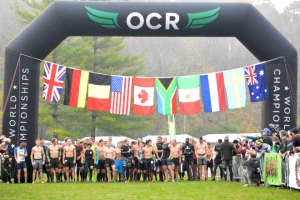
OCR World Championships announced this week that the 2016 race would feature championship races for three different distances – short (3-5 miles), medium (8-10 miles), & long (12-15 miles). Years from now, that announcement could effectively mark the beginning of specialization in obstacle racing.
Spartan Race, the market leader in obstacle racing, has always configured their championship into one of their longer and most difficult races in the range of 14-15 miles. While Spartan’s goal may be to showcase their championship as one of the most grueling events of the year, the model has not gone unquestioned. “Why is the championship race so fundamentally different than the vast majority of races that served as qualifiers throughout the year?”
Furthermore, there seems to be an underlying assumption that those who excel at longer distances (Spartan championship, World’s Toughest Mudder, etc.) are considered to be the best of the best. An apt contrast is often made to track and field, in that no one seems to think that Usain Bolt has to win (or even participant in) the Boston Marathon to be considered one of the best runners. Tim Sinnett provides a fantastic analysis of the sport of OCR in which this is discussed in detail. When we look at the highest levels of any running sport, it is hard to be the best sprinter if you also have to be a good endurance, runner.
While the comparison with traditional running sports certainly provides a valid and compelling platform for the debate, obstacle racing is inherently different than a track in a variety of ways. First, there is a feeding system for elite and pro track stars. It begins in middle school or before, and then high school, and then college in which athletes are selected and coached into the distances they are most likely to excel. While it will likely be different 20 years from now, elite obstacle racers arrive from a variety of backgrounds (CrossFit, ultra-running, track and field, cross country skiing, etc.)
Second, 800 meters is always 800 meters, and there is never talk of elevation gain. OCR evolved more as a business than a sport and as such, there is no such standardization in OCR in which every single race is different. Third, obstacle racing requires a more expansive set of skills such as grip strength, climbing, agility, heavy carries, etc. To be a sprinter, you simply have to train to run fast. To be an endurance runner, you simply have to train to run for a long time.
So, will we ever see elite athletes who specialize training and racing for specific distances? While answering this requires forward thinking and speculation of the future, I think it is possible. However, the incentive to specialize must be there and for that to happen at least two fundamental things must occur.
- The influx of highly-skilled athletes into the sport must continue. In the first five years of the sport, the top obstacle racers have been able to excel at all distances and types of races because of pure athletic superiority. As more and more “stars” have entered the sport, we have just now begun to see that athletes who regularly podium at every race might find themselves shuffled down the line 5 to 10 spots in races that don’t magnify their strengths. At the point in time when 25 people toe the starting line of each and every race with a truly legitimate chance of winning, the incentive to train and race to one’s strengths will be amplified.
- A sufficient supply of races that play to specialization is vital, and that means the number of quality races with prize purses for all distances will need to increase. If a pro/elite racer specializes in speed races, but there are only 1 or 2 races a year of that format, then s/he will be at a disadvantage. As of now, the supply of races is in the hands of businesses and those schedules will be dictated more by profit and loss than by advancement of the sport.
Back to the question. Will specialization occur at some point in the future? Probably. Possibly. Maybe. It will be contingent on further evolutions that may or may not occur. For now we enjoy the sport that we have and let each competitive racer decide what is best for her or him.
Disclaimer: The viewpoints expressed by the authors do not necessarily reflect the opinions, viewpoints and official policies of Mud Run Guide LLC, or their staff. The comments posted on this Website are solely the opinions of the posters.


Leave A Comment